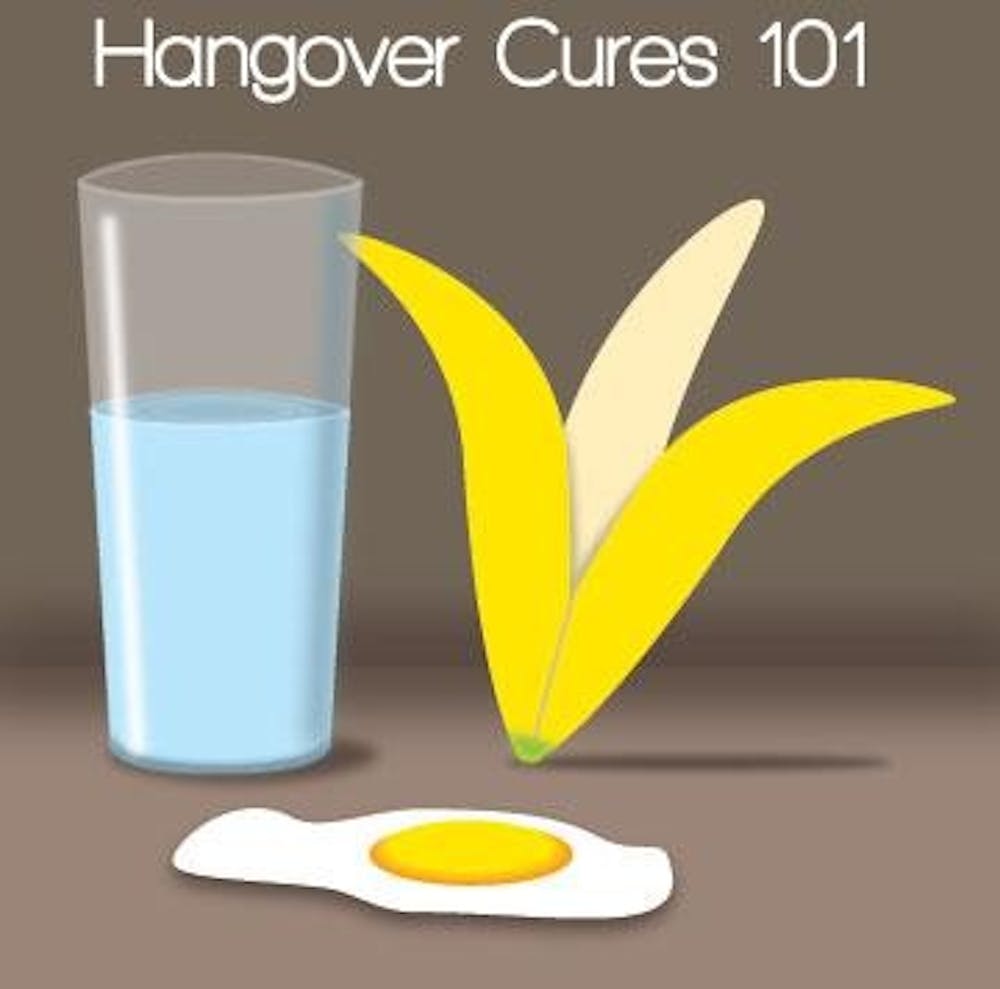
(ERIN KILLINGER | The Miami Student)
It's unfair that we can spend all day Saturday paying for Friday night. Many college students have tried a multitude of failed home remedies and folk cures, but science and nutrition confirm the essential remedies for quickly curing terrible hangovers.
An alcohol hangover, occurring after heavy drinking, is characterized by symptoms such as headache, fatigue, nausea, thirst, muscle aches, irritability and an overall feeling of illness. Symptoms vary from person to person and depend on the type and amount of alcohol consumed. A hangover begins within a few hours after one stops drinking when the blood alcohol concentration (BAC) level is falling. Hangover symptoms usually appear when one's BAC reaches zero. According to Dr. Jeffrey G. Wiese in the Annals of Internal Medicine, symptoms of a hangover are caused mostly by dehydration and the toxic effects of alcohol.
There are several direct bodily effects of alcohol consumption. Dehydration and an electrolyte imbalance occur because alcohol is a diuretic, which increases urine output. Low blood sugar (alcohol-induced hypoglycemia) is more of an occurrence during binge drinking and causes fatigue and irritability because glucose is a primary energy source for the brain. Gastrointestinal disturbances including irritation of the stomach lining and increased production of gastric acid can result in stomach pain, nausea, and vomiting. According to Dr. Robert Swift, associate professor in Brown University's Department of Psychiatry and Human Behavior, sleep disturbances occur as a result of hangover fatigue. Although alcohol helps us fall into light sleep, it disrupts REM sleep, or the "dream state," the more restorative sleep stage. Also, the most common problem among the college-aged population is being out later than normal when drinking which decreases the total amount of time slept.
So what are the best ways to alleviate these effects? Out of all the myths behind hangover "cures," these are a few scientifically-proven remedies according to Lacy Perry at Discovery Communications's subsidiary, HowStuffWorks™:
Eggs: Not only a source of energy, but they contain cysteine, which breaks down acetaldehyde, a toxin in the liver.
Bananas, kiwi and sports drinks: These potassium-rich foods replenish electrolytes and potassium lost after alcohol's diuretic characteristic has had an effect on the body.
Fruit juice: It increases the rate of detoxification and restores vitamins that were lost, again, due to alcohol's diuretic effect. Also, the fructose, or natural fruit sugar, provides energy.
Painkillers: They are helpful for reducing inflammation and aches, but only if they are caffeine- and acetaminophen-free.
Water: It doesn't only combat dehydration, but it dilutes leftover byproducts in the stomach. Drinking water is especially effective if it's done before going to sleep because it will fight dehydration after the body's complete breakdown of alcohol.
So why aren't some of the most common "remedies" encouraged? According to Perry, coffee, for instance, acts like a "band-aid" rather than a remedy. The caffeine does fight fatigue and alleviate headaches, but the diuretic properties are more significant. Ultimately, the caffeine in coffee will only dehydrate you further, prolonging one's attempted recovery. Additionally, carbohydrates like those found in burnt toast are found to alleviate nausea and low blood sugar. However, although carbon acts as a filter in the body, the carbon on burnt toast is not the same type of carbon that treats poisonings.
Enjoy what you're reading?
Signup for our newsletter
Hangover symptoms will normally decline over eight to 24 hours. Waiting it out is unpleasant, but trying these remedies may quicken the recovery.




